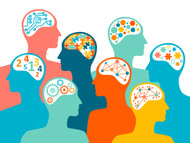Understanding Autism Spectrum Disorder (ASD)
Posted by e-Doctor on 20th Jan 2023
Autism Spectrum Disorder (ASD) is a neurodevelopmental condition that affects individuals differently, leading to a spectrum of characteristics and challenges. In Australia, as in many parts of the world, there is a growing awareness of autism and a commitment in providing support and resources to individuals and families affected by this condition.
What is Autism Spectrum Disorder (ASD)?
ASD is a complex neurodevelopmental condition that impacts social interaction, communication, and behavior. It is often referred to as a spectrum because individuals with ASD can have varying degrees of severity and diverse strengths and challenges. The term "spectrum" acknowledges the wide range of ways autism can manifest, from mild to severe, and highlights the uniqueness of each individual's experience.
Key Characteristics of ASD
Impaired Social Interaction:
● Difficulty in understanding and interpreting social cues and non-verbal communication.
● Challenges in forming and maintaining peer relationships.
● Limited interest in or understanding of social norms.
Communication Difficulties:
● Delayed or atypical language development.
● Difficulty initiating and sustaining conversations.
● Use of repetitive language or echolalia (repetition of words or phrases).
Repetitive Behaviors and Interests:
● Engagement in repetitive actions or routines.
● Strong attachment to specific interests or topics.
● Resistance to changes in routines or environments.
Challenges Faced by Individuals and familes with ASD
Educational Challenges:
● Need for specialised educational support and learning plans.
● Difficulty in navigating social aspects of school.
● Potential bullying or social isolation.
Communication Barriers:
● Limited ability to express needs and feelings verbally.
● Misunderstandings due to non-verbal communication difficulties.
● Frustration and anxiety related to communication challenges.
Sensory Sensitivities:
● Heightened sensitivity to sensory stimuli (e.g., lights, sounds, textures).
● Overwhelm or meltdowns in sensory-rich environments.
Families with a member who has Autism Spectrum Disorder (ASD) face a unique set of challenges that can impact various aspects of their lives. These challenges can be emotional, practical, and financial in nature.
Here are some of the common challenges faced by families with ASD:
Emotional and Psychological Stress:
- Diagnosis and Acceptance: The initial diagnosis of ASD can be emotionally overwhelming for parents and family members. Accepting and coming to terms with the diagnosis may take time.
- Constant Advocacy: Families often need to become advocates for their loved ones with ASD, navigating educational and healthcare systems, seeking appropriate services, and ensuring that their needs are met.
- Stigma and Social Isolation: There is still a lack of awareness and understanding of autism in society, which can lead to social stigma and isolation for both the individual with ASD and their family.
- Worry About the Future: Parents often worry about their child's future, including their independence, employment prospects, and long-term care.
Financial Strain:
- Cost of Therapies and Interventions: Many families face significant financial burdens due to the costs associated with therapies, interventions, and specialised education programs for their child with ASD.
- Lost Income: Some parents may need to reduce their working hours or quit their jobs to care for their child with ASD, leading to a loss of income.
Impact on Sibling Relationships:
- Siblings may feel neglected or overlooked when their parents need to dedicate a substantial amount of time and attention to the child with ASD.
- Siblings may also experience feelings of confusion or frustration due to the challenges associated with autism.
Daily Routine and Stress Management:
- Families often need to establish structured routines to accommodate the needs of the individual with ASD, which can be challenging and stressful.
- Managing meltdowns, sensory sensitivities, and behavioural challenges can be emotionally draining.
Lack of Respite and Support:
- Caregivers may have limited opportunities for respite, as finding qualified and trustworthy caregivers for individuals with ASD can be challenging.
- Many families lack a strong support network and may feel isolated.
- Educational Challenges:
- Navigating the educational system and advocating for appropriate educational services can be daunting for parents.
- Ensuring that the child receives an inclusive education with necessary accommodations and support can be an ongoing struggle.
Communication Difficulties:
- Communication challenges with the child with ASD can lead to frustration and misunderstandings within the family.
Addressing these challenges often requires a multifaceted approach. Families can benefit from seeking support from professionals, joining support groups, accessing community resources, and prioritising self-care.
It's important for society to promote awareness, understanding, and acceptance of autism to reduce the stigma and provide better support systems for families dealing with ASD.
Management and Support in Australia
Australia has made significant strides in providing support and resources for individuals with ASD and their families. Key elements of management and support include:
Early Intervention:
- Early diagnosis and intervention services, including speech therapy and occupational therapy.
- Access to government-funded programs, such as the National Disability Insurance Scheme (NDIS), which provides financial assistance for eligible individuals with disabilities.
Specialised Education
- Inclusive education practices in mainstream schools with additional support and accommodations.
- Specialised schools and programs designed for children with ASD.
Therapeutic Services:
- Access to various therapeutic services, including speech therapy, occupational therapy, and behavioural therapy.
- Support for developing social skills and managing sensory sensitivities.
Support Groups in Australia
Australia boasts numerous support groups and organisations dedicated to individuals with ASD and their families, including:
Autism Spectrum Australia (Aspect):
- Offers a wide range of services, including therapy, education, and employment support.
- Provides resources and information for individuals and families.
Autism Awareness Australia:
- Advocates for greater autism awareness and understanding.
- Offers information and resources for individuals and families.
Amaze (Autism Victoria):
- Provides information, support, and advocacy for individuals with ASD and their families in Victoria.
- Offers resources, workshops, and helplines.
Autism Spectrum Disorder is a diverse and complex condition that presents unique challenges and strengths in each individual. In Australia, efforts are being made to ensure that individuals with ASD receive the support they need to thrive. By increasing awareness, promoting early intervention, and providing access to resources and support groups, Australia is taking important steps toward a more inclusive society where individuals with ASD can lead fulfilling lives and reach their full potential.



